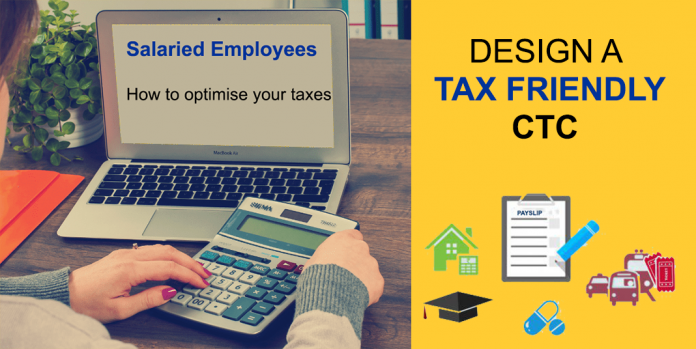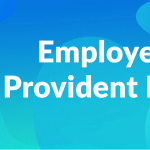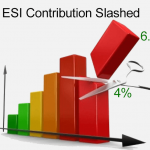The salaried class of taxpayers, mostly the middle class are the most tax regulated in our society. Employers would not like to infringe on the tax withholding obligations, salary payments require to be made through banking channels, whereby both earnings and taxes have traceability. Therefore, salaried employees must be abreast of all the tax rules to optimize their taxes and this blog attempts to outline the tax-saving alternatives and what can influence decision making.
Estimate Taxable Income, Savings Declarations & TDS
Taxes on salaries are paid to the Government through Employer affecting tax withholdings from monthly salaries, generally referred to as TDS. This monthly TDS is derived from the estimated taxable income of the employee, which in turn is a combination of his estimated salary and his tax deductibles.
These saving declarations may comprise of various tax beneficial payments covered viz Insurance premia, Social Security contributions like PF, NPS, etc under Chapter VIA of the Income Tax Act, estimated expenditure under certain tax-exempt allowances like House Rent Allowance (HRA), Leave Travel Allowance (LTC), certain perquisites, etc.
Read More: Income-Tax-Calculator-FY-2019-20
When will I need to declare savings?
Employees should declare saving declarations at the beginning of the financial year or on joining a new company so that an estimate of TDS is done as accurately as possible by your Employer.
Read more at: Submit investment declaration to your employer on time to avoid excess TDS
What Tax rules that Salaried need to know
The more relevant tax law that Salaried employees need to be familiar with is A) Income from the head Salaries B) Allowances and Exemptions viz HRA, LTA, Leave Encashment, Gratuity, Children Education Allowance C) Perquisites viz Company House, Company Car, Driver, ESOP D) Income from House Property and Interest on Housing Loan E) Bank Interest under the head Income from Other Sources. F) Deductions under Chapter VI-A.
Request a Demo for Payroll Services
Deductions under Chapter VIA
Chapter VI A, lists a variety of Financial Instruments, Social Security Contributions, Insurance premia, and some special circumstances of the taxpayer to afford him a tax relief viz supporting a family member with a disability or serious ailments, each of which has specific rules to claim deduction apart from an overall limit.
Section 80C – Payments made to specific purposes :
Payments made for specific purposes as listed can be claimed as a deduction up to a maximum of Rs.150,000 from Gross Total Income. In this list, it will be meaningful to segregate those items where the Employee may have no discretion as he is part of the company system. While there are many others where due to his individual circumstance or discretion can avail of other items of deduction.
Non Discretionary Contributions’
There are mainly two items of non-discretionary deductions. They are :
- Employee’s share of PF Contribution,
- Employee’s contribution to Group Superannuation Scheme
Should, the Employees contribution exceed Rs 1.50 lacs then he may have no more any incentive to avail of any other deduction item in 80C.
Discretionary and Specific circumstances based deductions :
It is this discretionary category of deductions, where a salaried employee needs to figure out what to do. What influences his decision making. It’s a combination of various parameters, financial goals, lifestyle, retirement plan, anticipated risks, and contingencies.
- Social Security Schemes: The purpose of these investments could be to provide insurance cover to the life of self & family members or to provide long term social security benefit to self and family members.
Read More, Social security schemes in India
- Life Insurance Premium– Premium paid for Self, Spouse and children can be claimed as a deduction. Amounts deposited in annuity plan of LIC or any other insurer for a pension from a fund referred to in Section 10(23AAB) or sum paid to purchase a deferred annuity or Unit-linked Insurance Plan (ULIP) can be claimed as deduction under this section. Payments towards Parents/in-law’s insurance premiums cannot be claimed for this purpose. An important point to be noted is that if the policy is issued on or prior to March 31, 2012, annual premium up to a maximum of 20% of the sum assured becomes deductible. For insurance policies issued on or after April 1, 2012, annual premium up to a maximum of 10% of the sum assured is tax-deductible.
- Public Provident Fund (PPF) PPF becomes an option for employees in small organizations who are not covered under PF Scheme. Deposits can be claimed under this category. Payments made for PPF accounts of Spouse and Minor Children can also be claimed as a deduction.
- Sukanya Samriddhi Yojana (SSY) is a small deposit scheme for the girl child launched as a part of the ‘Beti Bachao Beti Padhao’ campaign. Interest in this Scheme is at 1% percent, which is tax-free and the deposit is a permissible deduction under section 80 C. It is to be noted that there is a dual tax deductible available in this scheme. A Sukanya Samriddhi Account can be opened any time after the birth of a girl till she turns 10, with a minimum deposit of Rs 250 (Earlier it was Rs 1,000). In subsequent years, a minimum of Rs 250 and a maximum of Rs 1.5 lakh can be deposited during the ongoing financial year. The account will remain operative for 21 years from the date of its opening or till the marriage of the girl after she turns 18. To meet the requirement of her higher education expenses, partial withdrawal of 50 percent of the corpus is allowed after she turns 18.
- Financial Instruments – Fixed deposits/bonds – These instruments are useful to those who would like to make savings, get a tax deduction on it and have a fixed medium-term plan without making a longer-term commitment.
These are Deposits in Infrastructure bonds/debentures, Notified bonds of NABARD, Senior Citizen Savings Schemes, Five years tax-free fixed deposit with Banks, Five-year time deposits with a post office, National Savings Certificate (NSC), National Savings Scheme (NSS) would fall under this category. Investments in the name of family members are not allowed as a deduction under this category. In the case of NSC, the annual interest accretion is also eligible as a deduction in the year of its accrual.
- Education – Tuition fee paid for two children can be claimed as a deduction. Care must be taken to see that fee paid towards Donations, Building fund, Sport fund, Transport facilities, Library, etc. paid to educational institutions are not included in the tuition fee.
- Mutual funds/UTI– Equity Linked Savings Scheme (ELSS) are eligible for deduction under section 80C, Notified pension fund eligible for deduction under Sec.80C can be claimed as deduction under this category. Generally, debt funds and close-ended funds are not eligible for deduction under this category. Care should be taken to ensure that the mutual fund is qualified for Sec.80C before making an investment.
- Investment in housing – Repayment of housing loan (principal component), Stamp duty, registration fee, and other expenses for purchase/construction of residential house can be claimed under this category. Subscription to Home Loan Account Scheme of the National Housing Bank, Subscription to deposit scheme of a public sector or company engaged in providing housing finance can be claimed as deduction under this category.
Section 80CCD – National Pension Scheme (NPS):
NPS is now a well-settled scheme and a good avenue for those employees who cross the Rs 1.50 lac threshold under Sec 80C. Under this Section, the Employee can avail of an additional Rs 50,000 as a deduction.
Section 80D – Medical Insurance:
Medical Insurance premium paid by the employee for Mediclaim policies for Self, Spouse, Children, and Parents can be claimed under this category. Annual health Checkup expenses incurred for self and dependent family are also included u/s 80D to the extent of Rs 5,000. However, the maximum limit remains the same. Any contribution made to the CGHS or such other scheme as may be notified by Central Government (Finance Act 2013) can also be claimed under this category.
Expense Limits and coverage
- If the Mediclaim policy is for Self, Spouse, and Children, the maximum benefit that can be claimed under this section would be up to Rs.25,000/-
- If the Mediclaim policy is for Self, Spouse, Children, and parents, the maximum benefit that can be claimed under this section would be up to Rs.50,000/-
- If any parents in the family consist of a senior citizen, the maximum benefit that can be claimed under this section would be Rs.75,000/-
- In case any members of the family consist of self, spouse and children includes a Senior Citizen and Senior Citizen Parents, then the maximum benefit can be extended up to Rs.100,000
Section 80U – Disability of Employee:
Employee disability to include permanent physical disability, blindness, mental retardation, autism, cerebral paralysis, multiple disabilities, a flat deduction of Rs.75,000 with no requirement of any bill submission can be claimed under Sec.80U, provided the extent of disability is less than 80% as certified by a recognized Doctor as per the Indian Persons with Disabilities Act. Where the extent of disability is above 80% then the deduction that can be claimed would be Rs 1.25 Lacs. The Doctor is to issue the certificate in Form 10 IA.
Sec 80DD – Disability of Family Member
In case any employee incurs expenditure towards Medical, Nursing & Rehabilitation for a dependent relative suffering from permanent physical disability, including blindness, mental retardation, autism, cerebral paralysis, multiple disabilities, a flat deduction of Rs.75,000 can be claimed under Sec.80DD if the disability is less than 80% and a deduction of Rs.125,000 can be claimed if the disability is more than 80%. Deposits under LIC, UTI’s Scheme & other IRDA approved Insurers for the benefit of Physically Handicapped dependent (e.g. LIC’s Jeevan Aadhar) are considered as expenditure incurred on dependent relatives. To claim this benefit a certificate in Form 10 IA from a qualified doctor as prescribed for the specified disability in the Rules may require to be submitted to the employer.
Read More: Form 10IA – under section 80DD & 80U
Section 80DDB – Maintenance or medical treatment of handicapped dependent relatives:
In case any employee incurs expenditure on medical treatment of Self or dependent relative (spouse, parents, children or dependent siblings) or a member of HUF suffering from a terminal disease like Cancer, AIDS, neurological diseases, chronic renal failure, etc., a deduction to the extent of actual expenditure subject a maximum limit of Rs.60,000 can be claimed under this section. If this expenditure is incurred on a senior citizen in the family, the deduction limit shall be up to Rs.80,000. Premiums paid for their health cover of such dependent relatives with any insurance company in any specified schemes of the insurance companies shall also be treated as expenses incurred for this purpose. Original medical bills/receipts for the medical expenses incurred along with a certificate from a doctor in the format of Form-10I may require to be submitted to claim the benefit.
Read More: Form 10I – under section 80DDB
Section 80E- Repayment of Interest on Education Loan:
Repayment of Interest on Education Loan was taken from a Bank / Financial Institution for self, spouse/children for Higher Education can be claimed under this section, without any cap on the deduction claimed. Higher Education means any course of study pursued after passing the SSC or its equivalent from any School, Board or University recognized by the Central Government or State Government or Local Authority. This deduction can be claimed for a period of 8 years from the year in which interest was first paid. A copy of Interest paid certificate from Bank / Financial Institutions may require to be submitted to the employer to claim the deduction.
Section 80G – Donations:
Depending on the company policy on allowing deduction under this section, donations made by the employees to certain funds like Prime Minister Relief Funds, Chief Minister’s Relief Fund, National Defense Fund, an approved university/educational institution of National eminence, Fund set up by a State Government for the medical relief to the poor, Army Central Welfare Fund, etc qualify for deduction of 100% of amount donated under this section, which out any cap.
Donations made to Jawaharlal Nehru Memorial Fund, Prime Minister’s Drought Relief Fund, Indira Gandhi Memorial Trust and Rajiv Gandhi Foundation qualifies for a deduction of 50% of the amount donation without any cap.
Donations made to Government or any local authority for the purpose of family planning or Indian Olympics or such other Association/ institution established in India for the development of infrastructure for sports and games in India, or the sponsorship of sports and games in India, would qualify for 100% of the amount donated subject to 10% of the adjusted gross total income.
Donations made to Government or any local authority for any purpose other than family planning or to an authority for the purpose of dealing with and satisfying the need for housing accommodation or for the purpose of planning, development or improvement of cities, towns, villages or both, or to any Corporation referred to in Section 10(26BB) for promoting the interest of the minority community or for repairs or renovation of any notified temple, mosque, gurudwara, church or other places or to any NGO having a registration certificate under Sec.80G, will qualify for 50% of the amount donated subject to 10% of adjusted gross total income.
In case the employer does not allow deduction under this section as per the company policy, an employee can claim this deduction at the time of filing the tax returns.
A pertinent point to note is that Donations made to NGO’s generally which have a Sec 12A and Sec 80G Registration, the Employer is not obliged to consider the same for his TDS computation. In which case, as an Individual, you may do so in your tax return filing.
FBP – Flexible Benefits Plan- Perquisites for tax optimization
Many an employer for the middle and higher-level staff have an FBP policy and procedure. These are typically some benefits and perquisites to employees and their taxability is a function of the extent of claims and reimbursements made. Subject to the terms of company policy, an employee can select various components of reimbursements, commonly known as a Flexible Benefits Plan (FBP). The limits of each component under this plan are defined in the company policy with reference to provisions/ rules as per the Income Tax Act applicable to the year.
Generally, employees are to declare the number of reimbursements that they will like to avail under each FBP component, at the beginning of the financial year or at the time of joining. This amount would be set aside as an internal kitty form the CTC and set off against the bills the employee submits during the course of the year for claiming them as reimbursements. Unclaimed FBP amount from the kitty will be paid as ad-hoc Salary due, at times termed as Special Allowance or Variable Allowance at the end of a financial year or at the time of termination of the employment, whichever is earlier, which is subject to tax. Hence, FBP declaration amounts to that extent would reduce the net take-home of the employee in a given month unless he claims the same as a reimbursement in the said month.
Reimbursements are not treated as Salary. Hence, the amount paid under FBP would not form part of salary disclosed in documents given by employer like Form-16. Hence, if anyone would like to produce these documents to obtain any bank loans, it would result in limiting the overall income to the extent declared as FBP.
So, FBP is a trade-off between gross salary income, net take home and tax liability on the salary income, which employee requires to make keeping in view of all his requirements.
Typical Flexible Benefits Plan consists of the following options:
Food Coupon:
The value of food and non-alcoholic beverages or meal card provided by the employer is exempt from income tax to the extent of Rs. 100 per meal or up to 2,200 per month, assuming 22 workings days per month. If the value of food and non-alcoholic beverages or meal vouchers exceeds Rs. 100 per meal, the value in excess of Rs. 100 shall be taxable.
Gifts from Employer:
Gifts from employer up to Rs 4,999/- per annum are tax-free. Gift can be in cash or kind. Festival Gifts/ Vouchers from an employer may be a good option.
Vehicle Maintenance:
Vehicle maintenance is basically reimbursement of employees owned motor car but used for both official and personal purposes. These reimbursements can be towards fuel, maintenance, insurance expenses. The claim limits are set on the basis of engine capacity (CC). If the Car CC is less than 1.6 ltrs, then reimbursements up to Rs 1800 per month can be claimed, and Rs 2,400 per month can be claimed if the CC is above 1.6ltrs.
Where the company car is provided and with a driver, the entire expenditure on the company car and the Drivers salary is a cost to the company and there is a notional perquisite value of Rs 1,800 per month for car less than 1600 CC (Rs 2,400 per month for bigger car) along with Rs 900 per month for driver salary as prerequisite. This perk is added to the income and taxed accordingly.
Mobile Phone and Internet Bill Reimbursement:
The reimbursement of mobile and internet bills as per company policy used for the official purpose is tax-free. There is no limit on the amount of reimbursement and the limits are generally fixed by company depending on work profile.
FBP Unclaimed
The portion of FBP amount declared but not claimed by an employee by the end of the year is also termed as Unclaimed FBP.
This shall be paid to an employee at the end of the year or at the time of termination of employment as Salary dues or Special Allowance. It may be noted that the amount received as FBP from an employer is tax-free but salary dues or Special allowance will be fully taxable. Therefore the FBP declaration of estimated annual reimbursements may best be done as accurately as possible to maximize your tax deductibility.
HRA
House Rent Allowance or HRA is a tax beneficial allowance to provide for tax-deductibility to employees who live in a rented house. The tax deduction is the minimum of any of the 3 computations A) 40% of Basic Salary for Non-Metros and 50% for those in Metros B) Actual Rent paid less 10% of Basic Salary C) HRA received. If the CTC is well constructed the taxability of HRA is no more than 10% of Basic Salary.
Due to the widespread misuse of availing tax breaks on HRA and with the recent disclosure obligations in Form 16 and ITR1, employees are advised the following :
- To collect the PAN No of the landlord and submit the same to the Employer along with Form 12BA, which is the form to declare that you are living in rented accommodation.
- Enter and renew your Rent Agreement with the landlord to establish that you have a valid legal right of occupation.
- Collect rent receipt in accordance with your rental agreement terms from the landlord as proof of payment and discharge of your tenancy obligations.
Read More: Rent Receipt Format FY 2019-20
- As with effect from 2019-20 the Landlords PAN Number becomes a line item in your Form 16 and is required to be disclosed in your tax return in Form ITR1, it is advisable to validate with your landlord that he would be filing his tax returns. Else, the tax department could easily generate a mismatch statement and issue notices to both of you, one the tenant and the second is the landlord.
Leave Travel Concession (LTC/LTA)
Leave Travel Concession or allowance is one of the most popular but tricky benefits available to employees in claiming exemptions under taxable salary income
Valuation of LTA Exemption
The amount exempt under Section 10(5) of the Income-tax Act is the value of any travel concession or assistance received or due to the assessee:
- from his employer for himself and his family with his proceeding on leave to any place in India
- from his employer or former employer for himself and his family in connection with his proceeding to any place in India after retirement from service or after the termination of his service.
Please read blog https://www.resolveindia.com/blog/a-tricky-journey-claiming-leave-travel-concession-in-india/ for a detailed analysis of the provision
Conclusion
The typical middle-class salaried employee faces many a financial challenge and has a variety of aspirations, be it education for their children, healthcare for themselves or family members, housing, retirement planning, etc. This blog attempts to cover the numerous tax deductibles permissible under The Income Tax Act. Popularly, most may be aware of PF or LIC premia or a Donation under 80G, while the Act has many more tax incentives, which all may not be familiar with. For example, the NPS Scheme, or the Sukanya Samruddhi Yojana or entire interest on an Education loan or entire Principal loan repayment amount on a housing loan, healthcare costs of family members. These are avenues to be considered depending upon your current situation of yourself or your family and you remain the best judge of what is optimum for you.







Thanks for sharing this helpful information..it was easy to understand the content..good work..keep it up
I found your article very informative and I totally love how the concepts are explained in this blog post. Thanks for sharing your insights. It helps a lot.